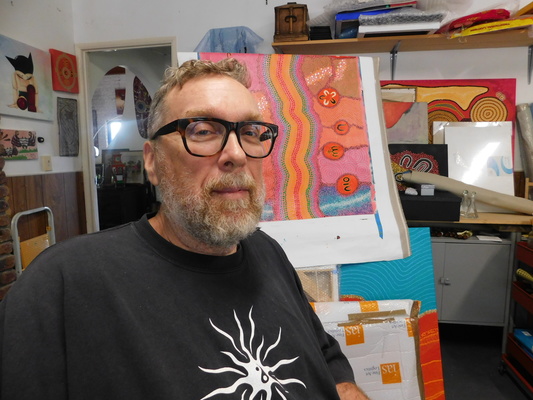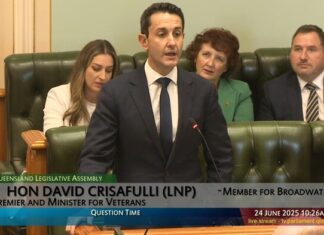Sunshine Coast man Paul Calcott represented three cultures when he spoke recently at the United Nations Headquarters in New York.
A Wiradjuri man from central NSW, a member of the LGBTIQ community and having lived with polio since a toddler his presentation was on LGBTIQ First Nations people living with a disability and he used his own traditional art work to get his message across.”It was huge to speak on behalf of our community and identify some of the issues,” he said.
In this Naidoc week Uncle Paul, as he is known, truly embodies this year’s theme – Voice, treaty truth – let’s work together for a shared future.
Paul was 18 months-of-age in 1960 when he contracted polio, the only one of six kids in his family to do so.
The infectious disease caused by a virus can in some people cause damage to the nerves that control muscle movement and in Paul’s case it affected his legs. He wore splints on his legs and the disease led to muscle wasting. He now suffers post-polio syndrome which is a recurrence of symptoms several years (usually 30-40 years) after an initial episode and affecting the same muscle groups involved initially and he has mobility issues as a result.For the past 10 years Paul has worked with First Peoples’ community on the Sunshine Coast who are living with disability, utilising traditional art and story-telling as a way of addressing social isolation and building resilience. He has coordinated 14 exhibitions showcasing art work by First Peoples living with disability and organises the NuunaRon art group for indigenous artists living with a disability on the Sunshine Coast.
An established Australian indigenous artist nationally and internationally his efforts have not only raised awareness to the wider community around the artistic and cultural contribution artists with disability can make to their community, but also assisted in economic participation by artists with disability.
Despite advocating for indigenous people with a disability through the First Peoples’ disability service Paul only recently sought assistance for himself by joining the National Disability Insurance Scheme (NDIS).
“I was quite fiercely independent and after working in the industry for so long, I was quite resilient. I had a strong support network around me and I was in the workforce, so I never really felt a need. And there were no real indigenous services, so I avoided it,” he said.
“But things have changed because I have polio and it is degenerative. We’ve learned from the others rolling out the NDIS. It seems to be a lot smoother accessing NDIS and it’s been very respectful and culturally responsible. I love gardening. I’m finding it hard to get out in the garden. With NDIS funding I can have someone help me in the garden.”
For more information about the NDIS phone Carers Queensland on 5409 3300, phone 1800 800 110, email SunshineCoastLAC@carersqld.com.au or visit visit ndis.gov.au








